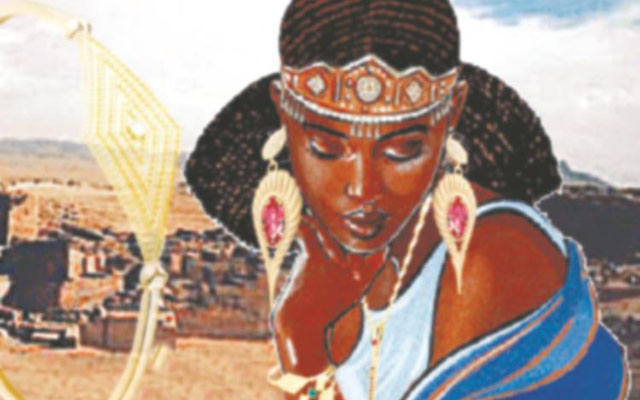Remembering powerful biblical women at Easter

Sekai Nzenza on Wednesday
“Who is your favourite woman in the Bible?” asked my niece Shamiso. She was preparing for a Bible lesson and prayer meeting with women from her church scheduled before Good Friday.
Shamiso has become very religious lately. She joined one of these new evangelical Christian churches where they sing, dance and sometimes they get possessed by the spirit.
A Zimbabwean prophet started this church a few years ago and his wife is also a prophetess.
The congregation meet somewhere in town and there are new centres of this church around small towns in Zimbabwe, South Africa, Malawi, Zambia and DRC.
For a whole week, since she came to stay with me before the Easter break, Shamiso talked about nothing other than the Prophet who started the church and what he had done to change her life.
Shamiso is a volunteer at the church and she is responsible for assisting with Sunday school.
Meanwhile, Shamiso’s husband Philemon, the one who used to sell airtime, phone chargers and other Chinese-made gadgets has moved to South Africa.
He is working for a transport company over there. We were relaxing at home in Harare when Shamiso asked me the question about powerful women in the Bible.
She sat on a chair in the far corner of the lounge room, studying passages in the Bible in preparation for the prayer session scheduled before Good Friday.
Shamiso kept on reading the Bible and underlying some sentences with a pencil. She was not the first person I have seen ruining books, any books, including the Bible, by underlining a whole sentence or even the whole page.
What if other people want to read the book and do not necessarily want to take note of highlighted sentences?
My cousin Piri sat next to the television, beer in hand as usual, while playing with baby Shalom, Shamiso´s new baby girl. Her other son Prince lay sleeping next to Piri, totally oblivious to the noise of the television.
Shamiso asked the same question again and I said to her, give me a moment to think. My thoughts quickly went to the romantic story of the Queen of Sheba and “The Song of Solomon.” But I felt too embarrassed to tell Shamiso that story. Then I asked myself why I should be embarrassed.
“The Song of Solomon” is one of the most beautiful, romantic and poetic songs ever written in the Bible. Besides, I was Shamiso’s aunt, tete. It was my role to educate her about life in general and to also tell her the truth about passages that some pastors often avoid in the Bible because they feel embarrassed to make sexual references. I took Shamiso’s New Internationalist Bible and read the passages from “The Song of Solomon.”
The words were not as poetic in this version of the Bible. Since you can now google any verse using Bible Gateway, I quickly went on the Internet and read to Shamiso from “The Song of Solomon” in the King James Version (KJV).
In chapter one, verses 2 to 6, it says: “Let him kiss me with the kisses of his mouth: for thy love is better than wine. Because of the savour of thy good ointments, thy name is as ointment poured forth, therefore do the virgins love thee. Draw me, we will run after thee: the king hath brought me into his chambers: we will be glad and rejoice in thee, we will remember thy love more than wine: the upright love thee. I am black, but comely, O ye daughters of Jerusalem . . . Look not upon me, because I am black, because the sun hath looked upon me: my mother’s children were angry with me; they made me the keeper of the vineyards; but mine own vineyard have I not kept . . . ”
Shamiso looked at me in disbelief. She shook her head and accused me of fabricating the story of love in the Bible. I showed her the Bible passages. But she argued that there are different versions of Bibles and these passages were surely not coming from the Holy Book. Then I had to sit down and tell her about the Queen of Sheba.
The story of the Queen of Sheba has remained a secret to many Christians. Biblical scholars say Sheba was a city in modern-day Ethiopia or somewhere in East Africa. The Queen was the ruler of that city. History says she was a black African like us. She had incredible power, wealth and wisdom. One day, during those ancient biblical times, the Queen of Sheba took the journey to Jerusalem to meet King Solomon. She brought long with her many gifts, spices and jewels from Africa.
During that time, Solomon was known as the great philosopher who could solve many riddles and proverbs.
When the Queen of Sheba met King Solomon, they engaged in deep philosophical discussions for weeks, possibly months. She quizzed Solomon on many riddles. There are passages in the book of Kings and in Chronicles where Solomon is said to have answered all her questions.
Although this is not explicit in the Bible, we can only deduce that the Queen of Sheba’s wisdom came from knowledge gained from her African ancestors.
For centuries, the use of orature, metaphors, riddles, parables and proverbs, (zvirahwe, tsumo nemadimikira) was used in Africa. This is probably why we relate so well to the readings in the Proverbs, Ecclesiastes and the Psalms.
Elsewhere, (not in the Bible) we learn that the Queen of Sheba returned to Abyssinia, in Africa. Nine months later, she gave birth to a son called Bayna-Lehkem (Menelik), which means “son of the wise man.”
Menelik became the founder of the Ethiopian Solomonic Dynasty. Whilst it cannot be proved that the Queen of Sheba had a son with King Solomon, there is evidence of the Queen of Sheba’s visit to King Solomon in Jerusalem.
Later on in The New Testament, Jesus refers to the Queen of Sheba as the Queen of the South, a Gentile, who travelled to meet Solomon. Jesus compares the rejection of Sheba to his rejection by the Jews.
In Matthew 12, verse 42, Jesus said, “The queen of the South shall rise up in the judgment with this generation, and shall condemn it: for she came from the uttermost parts of the earth to hear the wisdom of Solomon; and, behold, a greater than Solomon is here. “
“Could this be the truth or possibly a fable?” Shamiso asked.
I said I do not know. But if you are a Christian, as she professes that she is, then she must have faith in the Bible.
“Manje Solomoni naQueen We Sheba inyaya duku. Verenga yaDavid naBathsheba. Ndiyo nyaya manje!” said Piri, grabbing the Shona Bible and opening the Book of Samuel.
She read from 2 Samuel 11 about the story of King David and how he fell in love with a woman called Bathsheba, who was married to a man called Uriah. The passage reads: “And it came to pass in an eveningtide, that David arose from off his bed, and walked upon the roof of the king’s house: and from the roof he saw a woman washing herself; and the woman was very beautiful to look upon. And David sent and enquired after the woman. And one said, Is not this Bathsheba, the daughter of Eliam, the wife of Uriah the Hittite? . . .”
Being the king, David assigned Uriah to go and fight in battle. David made sure that Uriah confronted some brave men. Uriah and had no chance of survival. He died in battle. His wife Bathsheba went into deep mourning. After some time, David asked Bathsheba to come to his palace.
In Samuel 12, verse 24, it is written: “And David comforted Bathsheba, and went in unto her, and lay with her: and she bore a son, and he called his name Solomon: and the Lord loved him.”
“See? David killed Uriah so he could take Bathsheba as his wife. David was a man, like any other man,” said Piri, going back to sit down and drink her beer.
“Muri macousin aSatan!” declared Shamiso, calling us Satan’s cousins. But Piri laughed and said there were other examples of upright women in the Bible. “What about the woman of Samaria?” Piri said and laughed again.
“Tell her about the woman of Samaria.
But I said that was a common story.
Shamiso did not want to hear any more stories about bad women, even if those women received salvation afterwards, like the woman of Samaria who used to be a prostitute. She still wanted help to identify good examples of upright women.
I said there is of course, the “Book of Ruth” whereby a widowed daughter-in-law insists on living with her mother -in-law for the rest of her life. This is a beautiful story of loyalty and love.
In Ruth 1:16, King James Version (KJV) Ruth said to her mother in law, vamwene vake, “Entreat me not to leave thee, or to return from following after thee: for whither thou goest, I will go; and where thou lodgest, I will lodge: thy people shall be my people, and thy God my God.”
Dr Sekai Nzenza is a writer and cultural critic.








Comments